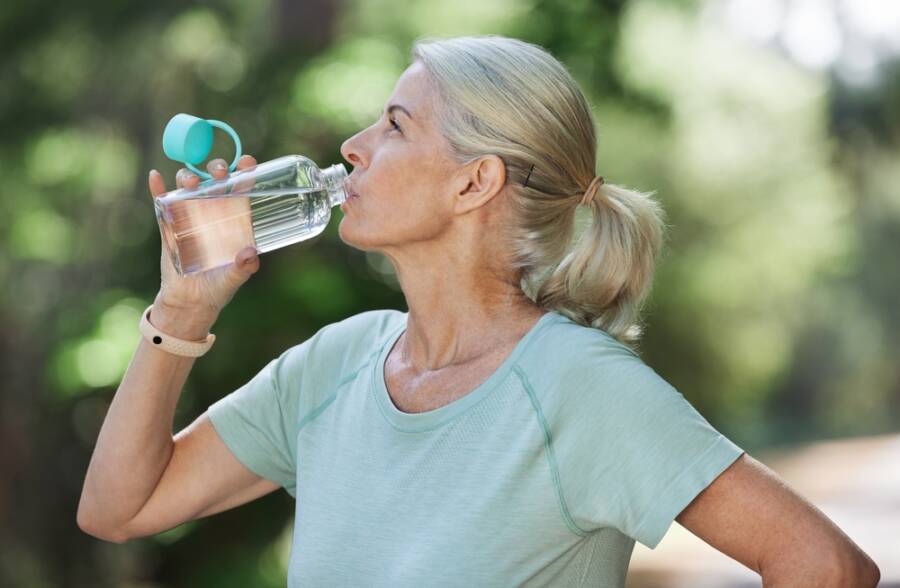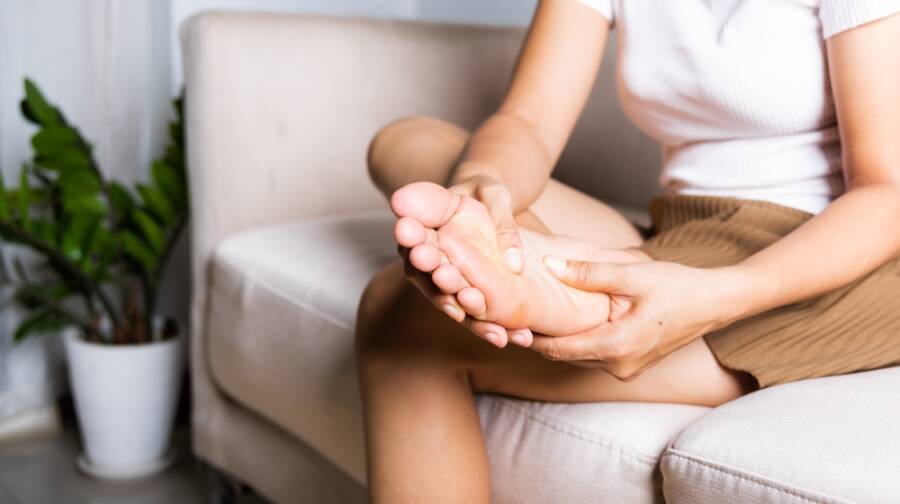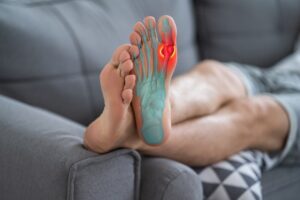Relieve swollen feet with these homemade remedies:
Have you ever had so much swelling in your ankles and feet that you could hardly identify them as your own? It happens to anyone, and the reasons behind this condition can result from uncomfortable shoes, pregnancy, extended periods of standing, prolonged travel, or dietary factors.
However, there are a couple of homemade remedies that help you relieve swollen feet quickly. Just note that if, after trying them out, your feet are still swollen, make an appointment with your doctor. You probably need medical treatment for the underlying cause.
Without further ado, here are a handful of simple home treatments approved by doctors themselves that are worth a try.

1. Make sure you’re always hydrated
You’ve probably heard this a lot, but we can’t stress enough how important it is to drink water. At least about half a gallon per day. That’s why one of the best ways to relieve swollen feet is to make sure you’re hydrated throughout the day.
It sounds a bit counterintuitive, right? But there is a whole scientific reason behind it. When your body sees that its fluid supply is running short, it will naturally hang onto those fluids, which might result in swelling. Increasing your water intake can also aid in clearing your system of extra salt and other waste.
2. If you have the possibility, try and raise your feet
Another efficient method to relieve swollen feet is by asking for the help of gravity, which works wonders. By allowing gravity to take its course and lifting your legs above the level of your heart, you help get rid of stored fluid from your lower extremities and provide a hand to your circulatory system. The procedure is easy to follow, which is the best part. Simply raise your legs using any accessible object, such as cushions or books.
Yoga positions can also be beneficial for swollen feet. A typical posture is to lie on the floor with your legs lifted and pressed against the wall.
3. Try out compression socks
Do you know that moment after a bad day when all you need to calm down is a hug from the right person? This is how you will feel after putting on compression socks over your swollen feet. With a light squeeze, compression socks improve blood flow by gently compressing your legs. This reduces swelling and discomfort by preventing fluid from building up in your ankles and feet.
These types of socks are easily accessible online and in a variety of locations, including pharmacies and shoe stores. Additionally, they are available in light, medium, and heavy weights. However, because compression may impair blood circulation, it is not recommended if you have peripheral arterial disease, so I advise you to ask your doctor before using them. Just to make sure they’re suitable for your condition.
4. Look after the salt intake
If you want to relieve swollen feet naturally, reducing your salt intake might be helpful as well. According to at least one study, men who consume a lot of salt and are 60 years of age or older are more likely to experience swollen feet.
Try avoiding adding salt to your meals and choosing low-sodium versions of your favorite dishes. It’s preferable to cook them at home, but when this isn’t possible, look at the labels and choose the ones that also contain fresh produce and avoid the processed ones. Pre-made meals usually contain a huge amount of salt in them. You know, to make them last a while!
5. Don’t forget about the supplements!
While having a diverse and healthy diet is mandatory, another way to make sure you get all the vitamins and minerals your body needs is by taking supplements. In this case, if you want to relieve swollen feet, magnesium supplements are recommended.
For example, the average adult male requires 410–420 mg of magnesium daily, whereas the average adult female needs 310–320 mg. Taking 200–400 mg of magnesium daily might assist in reducing edema.
But talk to your doctor before taking any magnesium supplements. Certain medical disorders, such as hypertension or renal disease, may not respond well to magnesium supplementation.

6. Massage your feet
Probably the best way to relieve swollen feet naturally is by massaging your feet gently. Besides being super effective, it will also help you relax. Apply pressure and use strong strokes to massage your feet in the direction of your heart. This might decrease swelling by helping in the elimination of lymph fluid from the affected area.
Doctors recommend massaging your feet every night before bedtime or before soaking them in Epsom salt. You can try out this Ginger Massage Oil for Lymphatic Drainage, which has a special formula created to provide gentle relief and relaxation for swollen and tired feet. It is available on Amazon for only $9.99.
7. Soak and comfort your feet in a cool Epsom salt bath
Adherents of Epsom salt baths extol the healing properties of a 15–20-minute soak in the tub. Transdermal magnesium supplementation is the fancy term for this therapy. Are the claims that Epsom salt pulls out toxins and relieves inflammation well-supported by science? Not actually, although many people who have tried it can vouch for it. Given its simplicity of usage, affordability, and low danger, many doctors also recommend it.
8. Eat more potassium-rich foods
Deficits in potassium might worsen hypertension and cause water retention. If you don’t have any restrictions regarding your diet, you might want to think about consuming more foods high in potassium. While potassium lessens the effects of sodium on the body, sodium still plays a role in water retention. The finest foods high in potassium are kidney beans, potatoes, lentils, and dried apricots.
9. Maintain a healthy weight
According to medical research, swollen feet and obesity are connected. Swelling in the lower limbs might result from poor blood circulation caused by a high body mass. It may place additional weight on the feet making walking more painful. Having walking difficulties may contribute to a more sedentary lifestyle, which in turn may raise the risk of water retention.
Reducing weight may also assist in reducing swelling in your feet and minimize the pressure on them. If you’re worried about your weight, seek medical advice.
10. Try to move as much as possible throughout the day
This is mainly advised for people who work in an office, or for more than 7 hours in a sitting position. Aim for a little movement every hour. Try to bend your knees and ankles, and take some time after lunch to go outside even if it’s for 10 minutes only.
Bottom line:
It’s crucial to seek medical assistance from your physician if none of these methods work. Try to keep a careful eye on your feet to determine whether the shoes you wear every day are too tight or are unhealthy for your feet overall due to the design or sole.
You don’t need to sacrifice comfort to wear fashionable footwear. Choose cozy footwear, at least until this problem is solved. In addition, there are three primary indicators that something is wrong with your feet and that you should see a doctor right away: increasing discomfort, redness, or leg ulcerations. There’s a chance that you have deep vein thrombosis.
Related article 10 Causes of Sudden Leg Weakness—No. 8 Is Very Common.






